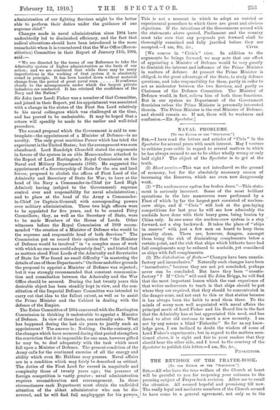NAVAL PROBLEMS.
[To THE EDMOR OF THE "SPECTATOR."]
have read the letters and articles of " Civis " in the Spectator for several years with much interest. May I venture to criticise your critic in regard to several matters in which he has always seemed to me to be either wholly wrong or only half right ? The object of the Spectator is to get at the truth.
(1) Short service.—This was not introduced on the ground of economy, but for the absolutely necessary reason of increasing the Reserves, which are even now dangerously weak.
(2) "The nucleus-crew system has broken clown."—This state- ment is seriously incorrect. Some of the most brilliant operations in the late manoeuvres were performed by a Fleet of which by far the largest part consisted of nucleus- crew ships, and if " Civis " will look at the gun-laying competitions for last year he will see how admirably the nucloids have done with their heavy guns, being beaten by China only. In one sense the nucleus-crew system is a step forward, not a step backward. It takes the place of "ships in reserve" with just a few men on board to keep them passably clean. There are, however, dangers, amongst them being the risk of diminishing complements below a certain point, and the risk that ships which hitherto have had full complements may be reduced to nucloids, yet considered as ships with full complements.
(3) The distribution of fleets.—" Changes have been unsatis- factory and inconclusive." Naturally such changes have been "inconclusive," because they are not yet concluded, perhaps never can be concluded. But have they been " unsatis- factory" ? If " Civis " will read Sir John Briggs, he will find that the most important lesson which the vast experience of that writer endeavours to teach is that ships should be put where they are required, that they should he concentrated in the danger-zone, and not sent to this or that station because it has always been the habit to send them there. To the minds of many men well acquainted with naval affairs the principal merit of Lord Fisher and his Board lies in the fact that the Admiralty has at last appreciated this need, and has dared to alter old customs to meet a new necessity. I am not by any means a blind "Fisherite." So far as my know- ledge goes, I am inclined to doubt the wisdom of some of Lord Fisher's experiments ; but in regard to the matters men- tioned above, it is right and fair to your readers that they should hear the other side, and I trust to the courtesy of the Spectator to publish this letter.—I am, Sir, &c.,
PIZOAIRESIS.










































 Previous page
Previous page